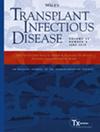The Swiss Transplant Cohort Study: Implications for Transplant Infectious Diseases Research.
IF 2.6
4区 医学
Q3 IMMUNOLOGY
引用次数: 0
Abstract
The longitudinal, nationwide Swiss Transplant Cohort Study (STCS) follows > 92% of all transplant recipients with comprehensive data collection tailored to overall and organ-specific transplant outcomes. Transplant infectious disease events are assembled under the auspices of transplant ID specialists using common definitions. With over 6000 active patients and a median follow-up exceeding 6 years, the cohort offers a unique platform for understanding real-world epidemiology in transplanted patients. Beyond observational analysis, the STCS supports randomized controlled trials to address specific research questions. This overview highlights the achievements of the STCS and explores its future directions.
瑞士移植队列研究:对移植感染性疾病研究的启示
纵向的,全国性的瑞士移植队列研究(STCS)跟踪了所有移植受者的约92%,并针对整体和器官特异性移植结果进行了全面的数据收集。移植传染病事件在移植ID专家的主持下使用共同的定义进行汇总。该队列有超过6000名活跃患者,中位随访超过6年,为了解移植患者的现实世界流行病学提供了独特的平台。除了观察分析,STCS支持随机对照试验来解决具体的研究问题。本文概述了STCS的成就,并探讨了其未来的发展方向。
本文章由计算机程序翻译,如有差异,请以英文原文为准。
求助全文
约1分钟内获得全文
求助全文
来源期刊

Transplant Infectious Disease
医学-传染病学
CiteScore
5.30
自引率
7.70%
发文量
210
审稿时长
4-8 weeks
期刊介绍:
Transplant Infectious Disease has been established as a forum for presenting the most current information on the prevention and treatment of infection complicating organ and bone marrow transplantation. The point of view of the journal is that infection and allograft rejection (or graft-versus-host disease) are closely intertwined, and that advances in one area will have immediate consequences on the other. The interaction of the transplant recipient with potential microbial invaders, the impact of immunosuppressive strategies on this interaction, and the effects of cytokines, growth factors, and chemokines liberated during the course of infections, rejection, or graft-versus-host disease are central to the interests and mission of this journal.
Transplant Infectious Disease is aimed at disseminating the latest information relevant to the infectious disease complications of transplantation to clinicians and scientists involved in bone marrow, kidney, liver, heart, lung, intestinal, and pancreatic transplantation. The infectious disease consequences and concerns regarding innovative transplant strategies, from novel immunosuppressive agents to xenotransplantation, are very much a concern of this journal. In addition, this journal feels a particular responsibility to inform primary care practitioners in the community, who increasingly are sharing the responsibility for the care of these patients, of the special considerations regarding the prevention and treatment of infection in transplant recipients. As exemplified by the international editorial board, articles are sought throughout the world that address both general issues and those of a more restricted geographic import.
 求助内容:
求助内容: 应助结果提醒方式:
应助结果提醒方式:


